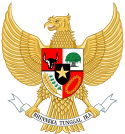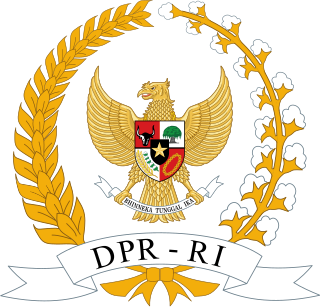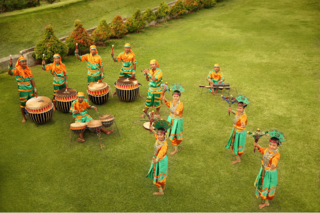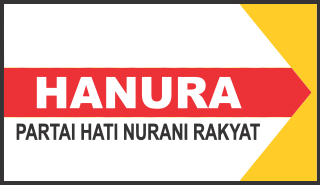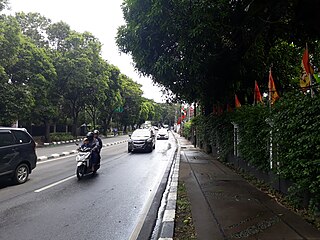| Parties | Votes | % | Seats | % | +/− |
|---|
| Indonesian Democratic Party – Struggle (Partai Demokrasi Indonesia Perjuangan, PDI–P) | 35,689,073 | 33.74 | 153 | 33.12 | n/a |
| Party of the Functional Groups (Partai Golongan Karya, Golkar) | 23,741,749 | 22.44 | 120 | 25.97 | −205 |
| National Awakening Party (Partai Kebangkitan Bangsa, PKB) | 13,336,982 | 12.61 | 51 | 11.03 | n/a |
| United Development Party (Partai Persatuan Pembangunan, PPP) | 11,329,905 | 10.71 | 58 | 12.55 | −31 |
| National Mandate Party (Partai Amanat Nasional, PAN) | 7,528,956 | 7.12 | 34 | 7.36 | n/a |
| Crescent Star Party (Partai Bulan Bintang, PBB) | 2,049,708 | 1.94 | 13 | 2.81 | n/a |
| Justice Party (Partai Keadilan, PK) | 1,436,565 | 1.36 | 7 | 1.51 | n/a |
| Justice and Unity Party (Partai Keadilan dan Persatuan, PKP) | 1,065,686 | 1.01 | 4 | 0.87 | n/a |
| Nahdlatul Ummat Party (Partai Nahdlatul Ummat, PNU) | 679,179 | 0.64 | 5 | 1.08 | n/a |
| United Party (Partai Persatuan) | 655,052 | 0.62 | 1 | 0.22 | n/a |
| Love the Nation Democratic Party (Partai Demokrasi Kasih Bangsa, PDKB) | 550,846 | 0.52 | 5 | 1.08 | n/a |
| Indonesian Masyumi Islamic Political Party (Partai Politik Islam Indonesia Masyumi, Masyumi) | 456,718 | 0.43 | 1 | 0.22 | n/a |
| People's Sovereignty Party (Partai Daulat Rakyat, PDR) | 427,854 | 0.40 | 2 | 0.43 | n/a |
| Indonesian National Party (Partai Nasional Indonesia, PNI) | 377,137 | 0.36 | 0 | 0.00 | n/a |
| Indonesian Islamic Union Party (Partai Syarikat Islam Indonesia, PSII) | 375,920 | 0.36 | 1 | 0.22 | n/a |
| Indonesian National Christian Party (Partai Kristen Nasional Indonesia, Krisna) | 369,719 | 0.35 | 0 | 0.00 | n/a |
| Indonesian National Party – Marhaenist Front (Partai Nasional Indonesia – Front Marhaenis, PNI–Front Marhaenis) | 365,176 | 0.35 | 1 | 0.22 | n/a |
| Indonesian Unity in Diversity Party (Partai Bhinneka Tunggal Ika Indonesia, PBI) | 364,291 | 0.34 | 1 | 0.22 | n/a |
| Indonesian Democratic Party (Partai Demokrasi Indonesia, PDI) | 345,720 | 0.33 | 2 | 0.43 | −9 |
| Indonesian National Party – Marhaen Masses (Partai Nasional Indonesia – Massa Marhaen, PNI–Massa Marhaen) | 345,629 | 0.33 | 1 | 0.22 | n/a |
| League of Supporters of Indonesian Independence Party (Partai Ikatan Pendukung Kemerdekaan Indonesia, IPKI) | 328,654 | 0.31 | 1 | 0.22 | n/a |
| Community Awakening Party (Partai Kebangkitan Umat, PKU) | 300,064 | 0.28 | 1 | 0.22 | n/a |
| Indonesian Muslim Awakening Party (Partai Kebangkitan Muslim Indonesia, Kami) | 289,489 | 0.27 | 0 | 0.00 | n/a |
| Islamic Community Party (Partai Ummat Islam, PUI) | 269,309 | 0.25 | 0 | 0.00 | n/a |
| Democratic Catholic Party (Partai Katolik Demokrat, PKD) | 216,675 | 0.20 | 0 | 0.00 | n/a |
| Aceh Orphans' Foundation Party (Partai Abul Yatama, PAY) | 213,979 | 0.20 | 0 | 0.00 | n/a |
| Republican Party (Partai Republik) | 208,157 | 0.20 | 0 | 0.00 | n/a |
| Familial Consultative Party of Mutual Assistance (Partai Musyawarah Kekeluargaan Gotong Royong, MKGR) | 204,204 | 0.19 | 0 | 0.00 | n/a |
| New Indonesia Party (Partai Indonesia Baru, PIB) | 192,712 | 0.18 | 0 | 0.00 | n/a |
| Indonesian National Solidarity Party (Partai Solidaritas Uni Nasional Indonesia, SUNI) | 180,167 | 0.17 | 0 | 0.00 | n/a |
| Love and Peace Party (Partai Cinta Damai, PCD) | 168,087 | 0.16 | 0 | 0.00 | n/a |
| Indonesian Islamic Union Party – 1905 (Partai Syarikat Islam Indonesia – 1905, PSII–1905) | 152,820 | 0.14 | 0 | 0.00 | n/a |
| New Masyumi Party (Partai Masyumi Baru, PMB) | 152,589 | 0.14 | 0 | 0.00 | n/a |
| National Party of the Indonesian Nation (Partai Nasional Bangsa Indonesia, PNBI) | 149,136 | 0.14 | 0 | 0.00 | n/a |
| Indonesian Democratic Union Party (Partai Uni Demokrasi Indonesia, PUDI) | 140,980 | 0.13 | 0 | 0.00 | n/a |
| National Labor Party (Partai Buruh Nasional, PBN) | 111,629 | 0.11 | 0 | 0.00 | n/a |
| National Freedom Party (Partai Kebangsaan Merdeka, PKM) | 104,385 | 0.10 | 0 | 0.00 | n/a |
| Democratic National Party (Partai Nasional Demokrat, PND) | 96,984 | 0.09 | 0 | 0.00 | n/a |
| Indonesian Democratic Alliance Party (Partai Aliansi Demokrat Indonesia, PADI) | 85,838 | 0.08 | 0 | 0.00 | n/a |
| Democratic People's Party (Partai Rakyat Demokratik, PRD) | 78,727 | 0.07 | 0 | 0.00 | n/a |
| Indonesian Workers' Party (Partai Pekerja Indonesia, PPI) | 63,934 | 0.06 | 0 | 0.00 | n/a |
| Democratic Islamic Party (Partai Islam Demokrat, PID) | 62,901 | 0.06 | 0 | 0.00 | n/a |
| Great People's Consultative Party (Partai Musyawarah Rakyat Banyak, Murba) | 62,006 | 0.06 | 0 | 0.00 | n/a |
| All-Indonesia Workers' Solidarity Party (Partai Solidaritas Pekerja Seluruh Indonesia, PSPSI) | 61,105 | 0.06 | 0 | 0.00 | n/a |
| Indonesian People's Party (Partai Rakyat Indonesia, Pari) | 54,790 | 0.05 | 0 | 0.00 | n/a |
| Indonesian Muslim Community Party (Partai Umat Muslimin Indonesia, PUMI) | 49,839 | 0.05 | 0 | 0.00 | n/a |
| Workers' Solidarity Party (Partai Solidaritas Pekerja, PSP) | 49,807 | 0.05 | 0 | 0.00 | n/a |
| People's Choice Party (Partai Pilihan Rakyat, Pilar) | 40,517 | 0.04 | 0 | 0.00 | n/a |
| Total | 105,786,661 | 100.00 | 462 | 100.00 | +37 |
Source: http://www.kpu.go.id/index.php/pages/detail/2008/11/Pemilu-1999
Note: Seat change numbers are displayed only for parties which stood in the previous election. |
